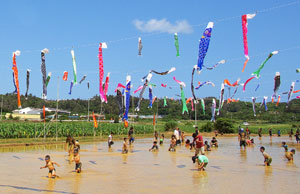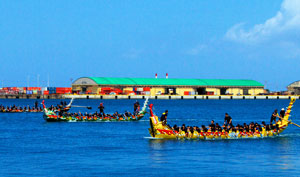
Golden Week in Japan is a combination of holidays which begins on the 29th of April and lasts through the 5th of May. It is a combination of an Emperor’s birthday, Constitution Day, Greenery Day and Children’s Day, skillfully arranged to include a weekend, for a total of a whole week away from work and school. Imagine the 4th of July celebrations covering an entire week!
Bright colored carp streamers were traditionally hung on a pole at each residence for every son in the family, but in recent years, there is a streamer displayed for each child in the family. Parks, bridges, storefronts, main streets and bridges crossing rivers have also become famous for the pennants in recent years. This year is the first time I witnessed carp streamers being hung over a flooded rice paddy.
The scene above can only be described as a Mud Festival. Children of all ages, teachers and even a few parents frolicked in the mud for hours. The temperature was in the high seventies and shade was scarce. The children played catch with rubber balls, played games of tag, mud wrestled, tossed mud balls and attempted to drive bicycles across 2×12 boards at the far end of the field. Live bands played folk music and food booths grilled chicken and served refreshments several hundred yards away from the rambunctious mud dwellers. The smell of charcoal, soy sauce and grilled chicken lured me away and I probably missed a great group photo opportunity; it always takes place at the end of an event like this, but I had to clean and charge my cameras for the next day’s event, miles away in the big city.

From the Mud Festival on Saturday the 2nd of May in northern Okinawa, to arrive in the capitol city of Naha in time to catch the Dragon Boat Races on Sunday, required waking up at 4AM. Here the lively Okinawan music, the scent of fresh grilled festival foods and tents providing shade were right at the water’s edge. The races take place in the Naha Harbor, which faces the East China Sea. The lighting was ideal for shooting the swift-moving boats. Even with hundreds of excited participants and thousands of spectators, it was easy to move along the length of the docks and find a place to steady the zoom lens of my camera.
Dragon boat races have their origin in ancient China and are now held worldwide. The most common belief is that the ritual is performed for two reasons: safety for the fishermen at sea and a bountiful harvest for farmers. Each of the brightly colored boats had around 40 rowers, someone steering with a rudder at the tail end, a coach standing in the center, and someone at the dragon’s head coordinating the rowing. He, or she, would chant and beat a drum to keep the rowing in a rhythm and prevent the boat from going in circles or, worse yet, tipping over if the rowing wasn’t precision.
In Japan, it’s not important who wins or looses, so I didn’t take note of which boat crossed the finish line first or last. What’s important is that everyone participated and had a good time. That’s what Golden Week is all about!
by Michael Lynch
Story and photos: © 2009 Michael Lynch. All rights reserved.

Leave a Reply